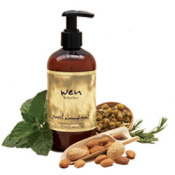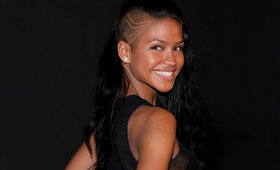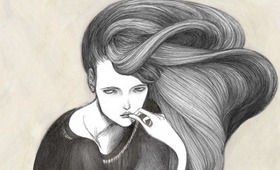
Your stylist gives you one set of instructions to care for your hair, product lines give you a totally different story and your mother swears by her age-old hair tricks that involve lots of mayonnaise. Who to trust?
An expert, we think! To get straight answers on all of our most pressing questions about hair care, we asked Chaz Dean, hair artist extraordinaire and creator of the WEN hair care system, a line of non-lathering, hyper-conditioning cleansers and natural styling products. Dean started WEN 20 years ago, after noticing all the struggles his salon clients had with their locks. Now WEN has a rabid following, and the newer additions—WEN Pets and WEN Kids—are all free of wheat, gluten, soy, nut and menthol products, making them ideal for adults with allergies, as well.
Dean answers all of our nagging FAQs about hair. How often do you wash? Can taking prenatal vitamins really make hair grow more quickly? Read on to find out!
Q: How many times a week should we wash our hair? (For real!)
A: No more than twice a week if you use traditional shampoos.
“Any shampoo that lathers is made up of harsh chemicals and sulfates that strip the hair of its natural luster, moisture, shine, color, and elasticity, so the less you use them, the better. Shampoos were created to clean the hair. They’re not imparting any strength. Every time you lather up, you rob your hair of natural essential oils and in turn they replenish at a rapid pace so you end up with an oily scalp or scalp issues and dry hair because it never catches up.”
But, Dean adds, with cleansing conditioners, the more often you use them, the better. They act as moisturizers. “[Even] if you only applied them once a week to your skin rather than every day, you’d notice the difference,” says Dean.
Q: Are dry shampoos sufficient to keep hair fresh between washes?
A: Yes. Dry shampoos work, just make sure to check the ingredients.
“Dry shampoos are okay to use to keep things fresh, but know that they don’t add any benefit to your hair. Check the ingredients of the products you’re using and ensure they’re not loaded with alcohols or proteins that could dry hair out even further. The worst thing that will happen with dry shampoo is that you’ll end up dulling down your hair.”
Q: Is there any proven method for going to bed with wet hair and having it look good when you wake up?
A: Yes, but let your hair partially air dry first.
“The best tip: don’t go to bed with your hair soaking wet. Wash your hair right away when you get home for the night so that it has time to dry before bed. After washing, put in a leave-in conditioner and a smoothing, styling cream. Get it at least 75% dry. If it’s long, twist it up into a loose bun (emphasis on ‘twist’) and secure with a breathable scrunchy band. When you wake up and release it, you’ll have those natural, beachy waves.”
Q: How many weeks can you go between haircuts?
A: Cut your hair as soon as you feel dry ends.
“Cut your hair before the ends split. Once you have split ends, [your hair] will keep disintegrating. You’ll feel the ends start to dry around the six-week period.”(Fun fact: Dean has noticed that many customers who use non-lathering cleansers have gone up to two years without a cut!)
Q: Is it true that taking prenatal vitamins can actually help your hair grow faster?
A: It’s true!
“They actually can. What prenatal vitamins do is speed up every process in your body because your body thinks it’s getting nutrients for two.” Note: Dean strongly cautions that you consult your physician before deciding to take any, though.
Q: What can you do to make your hair more manageable if it’s dry, fine, or coarse?
A: All three problems are solved with essential oils.
“By applying natural essential oils or treatment oils to your scalp at night and then cleansing, rinsing, and repeating in the morning, you’ll stimulate the scalp to promote healthier, fuller, shinier hair. If you have coarse hair, oils will also tame your strands.”Recommendations from WEN: Fig Sweet Orange Oil for dry and coarse hair; Tea Tree Eucalyptus for fine hair.
Q: Are pricier, higher-end styling products really better for your hair?
A: Not always. It’s more important to check out the ingredients of the product, regardless of cost.
There’s a reason almost every shampoo on the shelf highlights ‘protein’ as an ingredient. Proteins are the building blocks of hair growth and help reconstruct hair.
“Less expensive brands don’t load up on proteins because they’re costly. These brands can strip your hair. Pricier products do load up on proteins, which are meant to strengthen hair. But if your hair is dry and brittle, adding more protein actually makes it even more dry, and can lead to more breakage.”
So, be sure you find a product with the right balance. Check the ingredients list, and look for a product that contains more moisturizers with a small amount of protein to help lock in hydration. “Today you can be more aware of ingredients thanks to the Internet,” says Dean. “Always remember that just because a product is more expensive doesn’t mean it’s better.”
Q: Is it ever okay to use drugstore dye?
A: Only if you’re changing one to two shade levels.
“Be careful of the color choices first and foremost. Box dyes won’t damage hair because they’re pretty mild, but they often don’t give you the results you’re looking for—especially if you’re going for a drastic color shift. For example, you can’t go from dark brown to blonde with those products. But if you’re only going one to two shade lighter or darker or updating your roots, you should be okay.”















